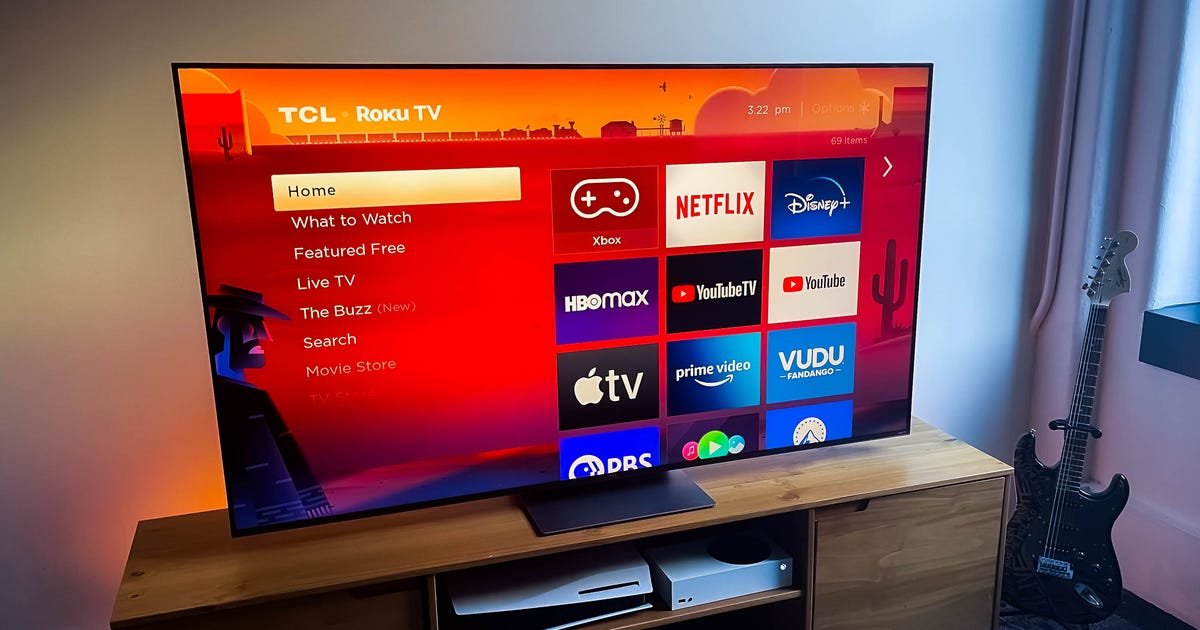In this article:
If you’re in the market for a new smart TV, look no further. Almost all TVs these days have smart features, allowing streaming movies from Netflix and Disney Plus without a separate device. However, it can be hard to know which TVs’ smart features are the best. Many manufacturers partner with established brands like Roku, Amazon and Google, which means they’ll all be different when it comes to being “smart.”
Our TV reviews take smart TV systems into account, but we think that picture quality for the money is usually more important when purchasing a new TV. That’s because you can always “replace” the TV’s built-in system with a good streaming device, most of which cost less than $50. The exception is for budget TVs, where the price of the streaming device could make up a significant percentage of the cost — for this list, unlike our main best TVs list — we weighted the importance of the smart TV system higher for budget models we had reviewed.
Our list below is generally arranged in order of which TVs provide the best picture for the money, but we also note how much we like (or dislike) the built-in smart TV system.
David Katzmaier/CNET
Product details
Sizes
55-, 65-, 75- 85-inch
TV Technology
QLED with Mini-LED
Smart TV
Yes (Roku TV)
Resolution
4K
HDMI Ports
4
For the last five years the TCL 6-Series has been our favorite TV for the money, and the 2022 version — also known as the R655 series — is no exception. This TV has an excellent image thanks to mini-LED tech and well-implemented full-array local dimming that helps it run circles around just about any other TV at this price. It improves upon the previous R635 series with more gaming extras and a new center-mount stand that you can elevate to make room for a soundbar, although the new 85-inch size has standard legs. And finally, the Roku TV operating system is our hands-down favorite.
Note that in addition to the R635, which this TV replaces, other versions of the 6-Series were released in 2021 and remain on sale. The R646 series uses the Google TV operating system but otherwise has similar specifications to the R655 models reviewed here. The R648 series has 8K resolution and is significantly more expensive.
The prices shown below are for the 65-inch size.
Read our TCL 6-Series (2022 Roku TV) review.
You’re receiving price alerts for TCL 6-Series Roku TV
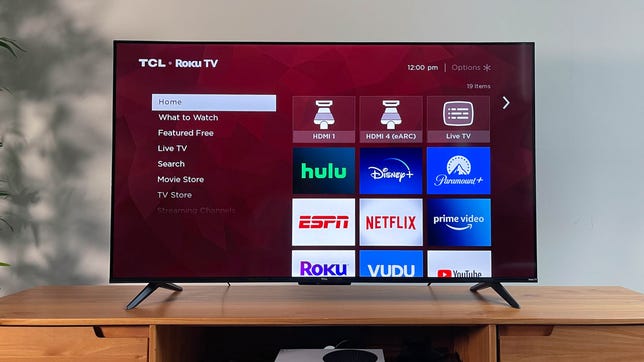

David Katzmaier
Product details
Sizes
43-, 50-, 55-, 65-, 75-, 85-inch
TV Technology
LED
Smart TV
Yes (Roku TV)
Resolution
4K
HDMI Ports
3
The picture quality of the TCL 4-Series Roku TV was only a slight step behind the Vizio V-Series (below) in our 2023 budget TV test, but we liked its Roku smart TV system better than Vizio’s SmartCast, so the TCL gets the top spot on this list. The 4-Series lacks the Dolby Vision, Bluetooth connectivity and AMD FreeSync with a variable refresh rate, all of which the Vizio offers, but in our book superior smart TV streaming is more important at the budget level.
The prices shown below are for the 50-inch size.
You’re receiving price alerts for TCL 4-Series
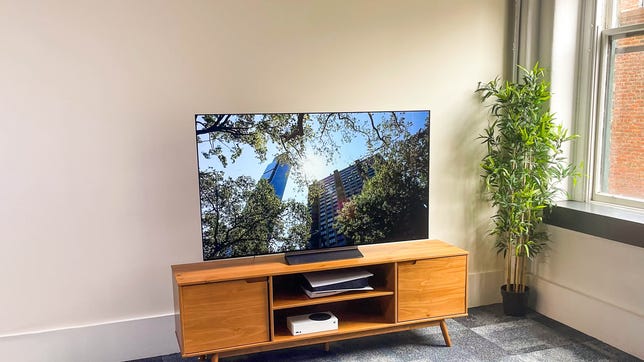

David Katzmaier/CNET
The C2 represents the pinnacle of picture quality at a price that’s admittedly high, but not too crazy. It beats any non-OLED TV on this list, including the Samsung QN90B below, with its perfect black levels, unbeatable contrast and superb off-angle viewing. It also has superb gaming features, making it the perfect companion to an Xbox Series X or S, PlayStation 5 or both. The C2 comes in a wide variety of sizes as well, although the bigger models are really expensive.
Like its predecessor the C1, the C2 is bogged down by the WebOS smart TV system. Signing in to an LG account unlocks another feature, customized recommendations and additional user accounts. LG touts the fact that you can set up favorite sports teams, for example, but most people will just go straight to the app and skip the clutter. On a TV this expensive, you should just attach a good streaming device instead.
Read our LG C2 series OLED TV review.
You’re receiving price alerts for LG OLED C2


David Katzmaier
Product details
Sizes
55-, 65-, 75-inch
TV Technology
Mini-LED with local dimming
Smart TV
Yes (Google TV)
Resolution
4K
HDMI Ports
4
Among midpriced models we liked the TCL 6-Series just a little better in our side-by-side comparison, but this Hisense is a strong contender. Its excellent image quality is anchored by best-in-class brightness that improves its bright-room picture quality and makes HDR TV movies, shows and games really pop. It’s actually brighter than the TCL with better contrast, but the TCL’s slightly more accurate image gave it the edge overall. The Hisense uses Google TV instead of Roku, and unlike the TCL, the U8H includes an ATSC 3.0 tuner. Frankly, you can’t go wrong with either one.
The prices shown below are for the 65-inch size.
Read our Hisense U8H review.
You’re receiving price alerts for Hisense U8H Google TV
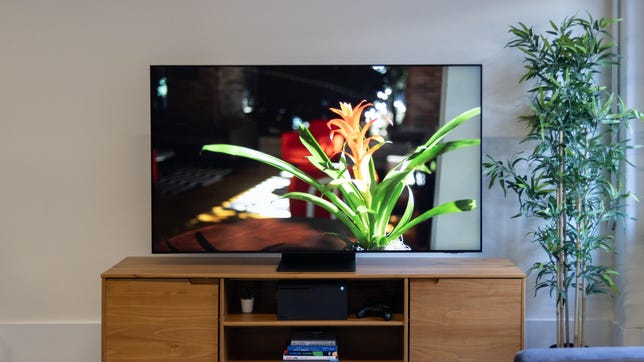

David Katzmaier/CNET
Looking for a high-end TV with spectacular image quality, but don’t want an OLED? The Samsung QN90B is your best bet. This TV uses QLED TV tech augmented by mini-LED for a brighter image than any OLED TV. The spectacular contrast of OLED still won out in our side-by-side tests, but the QN90B QLED screen comes closer than ever.
The older version of this TV, the QN90A, remains on sale for hundreds less. It’s also an excellent performer but it’s slightly dimmer than the QN90B. It also lacks some of the 2022 model’s features, including the new game hub with cloud gaming.
Samsung’s onscreen smart TV system is excellent, with quick responses and plenty of apps — we’d take it over LG or Vizio’s systems. We still like Roku and Android/Google TV (found on Sony TVs) better overall, however, because they have even more apps. Just like most TVs now (including Roku), Samsung has the Apple TV app and works with Apple’s AirPlay system.
The prices shown below are for the 65-inch size.
Read our Samsung QN90B review.
You’re receiving price alerts for Samsung QN90B


David Katzmaier/CNET
When we compared the best 2022 budget TVs, the picture quality of Vizio V-Series clearly emerged as the leader of the pack. The Vizio offered the most balanced and accurate picture during our comparisons, and it comes with some useful extras such as Dolby Vision support, Wi-Fi 6E, Bluetooth compatibility and variable refresh rate for potentially smoother gaming.
The biggest downside of the Vizio is its smart TV platform, Vizio SmartCast. It’s crowded, slow and littered with ads for platforms such as Tubi and Kidoodle TV. That’s why the TCL 4-Series with Roku gets the top slot. That said, if you value its image quality and extra features, you can always add a separate streaming device to this Vizio.
The prices shown below are for the 50-inch size.
You’re receiving price alerts for Vizio V-Series
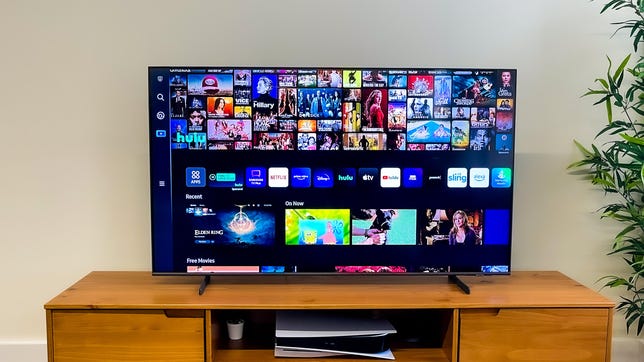

David Katzmaier/CNET
Product details
Sizes
43-, 50-, 55-, 60-, 65-, 70-, 75-, 85-inch
TV Technology
QLED
Smart TV
Yes (Tizen)
Resolution
4K
HDMI Ports
3
Samsung is the brand that sells more TVs than anyone, and one of its most popular is the Q60 series. Its sleek QLED screen design stands out compared with the other TVs on this list — even though the ultrathin OLED models are sleeker — and it offers better features, image quality and more sizes than models like the TCL 4-Series and Sony X80K. The TVs listed in this article are all superior values, but if you want a Samsung TV and can’t afford the QN90A, this is a great choice.
Note that the 2021 version, the Q60A, is still on sale and can be cheaper than the Q60B in some sizes. The newer version measured brighter in our tests, but if you want the best deal, stick with the Q60A if it’s still available.
The prices shown below are for the 55-inch size.
Read our Samsung Q60B review.
You’re receiving price alerts for Samsung Q60B


David Katzmaier/CNET
Product details
Sizes
50-, 65-, 75-inch
TV Technology
LED with local dimming
Smart TV
Yes (SmartCast)
Resolution
4K
HDMI Ports
4
The Vizio MQX is one of the least expensive TVs to feature full-array local dimming, which lets it reproduce shows, movies and games with enough contrast and pop to do HDR justice. The MQX has fewer dimming zones than more expensive TVs like the TCL 6-Series, but they’re more than enough to create excellent overall picture quality, with bright highlights, dark black levels, punchy contrast and accurate color.
Unlike the M7 last year, the MQX has a true 120Hz refresh rate, which allows compatibility with 4K/120Hz signals from game consoles like Xbox Series X and PlayStation 5 and worked well in our tests. Vizio supports both major HDR formats, HDR10 and Dolby Vision, in the M-Series.
Vizio’s SmartCast smart TV menus haven’t changed much aside from adding a new “Inputs” button, a welcome addition… albeit one Roku TVs have offered for years. Although all the major streaming services are accounted for, the interface is worse than Roku and Google TV. The main issue with Vizio is cluttering the screen with a bunch of TV shows and movies we don’t care about.
Roku’s grid of apps is simple and familiar, and if you want your homepage to show more relevant programming, Google TV does a much better job. But If you can’t save up for the TCL 6-Series and want a better picture than the 4-Series, the Vizio MQX is an excellent happy medium. Just make sure to get a Roku.
Read our Vizio MQX review.
You’re receiving price alerts for Vizio MQX
How does CNET test smart TVs?
Our TV reviews follow a rigorous, unbiased evaluation process honed over nearly two decades of TV reviews. Our primary TV test lab has specialized equipment for measuring light and color, including a Konica Minolta CS-2000 spectroradiometer, a Murideo Sig-G 4K HDR signal generator and an AVPro Connect 8×8 4K HDR distribution matrix. We use Portrait Displays CalMan Ultimate software to evaluate every TV we review. In every CNET TV review, three or more similar TVs are compared side by side in various lighting conditions playing different media, including movies, TV shows and games, across a variety of test categories, from color to video processing to gaming to HDR. Our reviews also account for design, features, HDMI input and gaming compatibility and other factors.
When specifically evaluating smart TV performance, we use all of the major features available on the platform and note how they stack up against the competition. Our metrics include: overall platform ease-of-use, effective layouts and design, search capabilities, privacy settings, the number of apps and their performance, and the overall speed and reliability of the system.
TV FAQs
We’ll post the answers to commonly asked TV questions below. If you have any others, feel free to reach out on Twitter (@dkatzmaier), or by clicking the little envelope icon on my CNET profile page.
What’s the best smart TV system for streaming?
At CNET our favorite is Roku for its simplicity, while Google TV is our runner-up for its impressive integration with other Google services such as Google Photos and YouTube TV. Samsung TV’s system is our third choice, with Amazon Fire TV and LG left as some of our least favorite options.
In any case we don’t consider the built-in smart TV system that important, because you can always connect a streaming device to any TV.
What about Amazon Fire smart TVs?
Amazon makes a full range of smart TVs that run on their Fire operating system. The Fire TV platform is not one of our favorites because of the fact that ads are featured prominently throughout. We just don’t appreciate the TV becoming a giant rotating billboard for content or ads when in screensaver mode. In addition, we’ve found other TVs tend to have better picture quality than most Fire TVs.
The Toshiba M-Series Fire TVs seem like they could buck this trend. We’ve yet to review one, but will update this list when we do.
Do smart TVs come with Alexa and Google?
Many smart TVs come with some kind of voice assistant. All Amazon Fire TVs come with Alexa built in, while Sony, TCL and Hisense TVs that run on Google’s operating system offer Google Assistant. Many new Samsung and LG TVs come with both Google Assistant and Amazon Alexa built-in as well. Roku TVs and Vizio TVs, meanwhile, respond to voice commands but don’t work with Alexa or Google Assistant.
On most of these TVs you’ll need to speak into the remote to use voice commands, but some also respond to hands-free “Alexa” or “Hey Google” wake words, just like a smart speaker. And many TVs can also be paired with a smart speaker, such as an Echo Dot or Google Nest Mini, to receive voice commands.
How big a TV should I get?
In our opinion bigger is better, and your money is best spent on large screen sizes rather than a slight upgrade in image quality. The answer also depends on room size and seating distance: If you have a big room and sit farther away, you’ll want a bigger TV. The answer also depends on room size and seating distance.
How do I get the best TV sound?
Most TVs sound terrible because their thin cabinets don’t have room for decent-size speakers or bass. If you want to get good sound you should buy an external audio system. Even an inexpensive soundbar will deliver much better audio quality than a TV’s built-in speakers. The Roku Streambar is a good example of a device that integrates a streaming system with a soundbar into one product.

